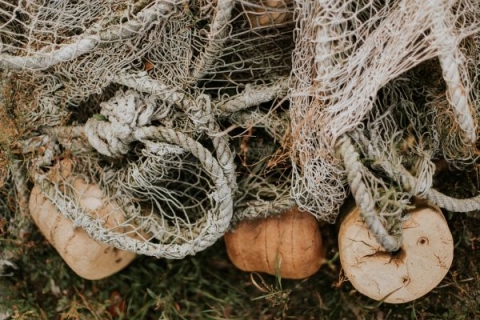

A new project called Innovative Fishing Gear for Oceans (INdIGO) is aiming to develop a completely biodegradable fishing net with a controlled lifespan
17 December 2019
3 min read
The University of Portsmouth is aiming to tackle one of the most dangerous types of marine pollution blighting the world’s oceans – ‘ghost fishing’.
Ghost fishing refers to fishing gear, such as nets or traps and pots that has been lost or dumped at sea. Much of this gear is made of plastic and highly durable synthetic fibres, which take hundreds of years to break down.
This gear damages marine habitats and entangles and kills fish, marine mammals and seabirds, long after it has been left behind – hence the term ‘ghost fishing’. It is also a danger to boats, catching in vessel propellers.
It is estimated that 25 per cent of marine litter is from the fishing industry in the form of nets.
Abandoned, discarded or lost fishing gear is having a significant and growing impact on marine life. While the environmental implications of marine litter are well documented, the economic impacts are largely unknown, although estimated to be large.
Dr Ben Drakeford, Senior Lecturer in Economics and Finance
A new project called Innovative Fishing Gear for Oceans (INdIGO) is aiming to develop a completely biodegradable fishing net with a controlled lifespan. The nets will biodegrade into natural materials within two years, not into smaller bits of plastic causing further pollution.
INdIGO is a 4.2m euro project from the EU’s Interreg programme, funded by the European Regional Development Fund. It involves the Universities of Portsmouth and Plymouth in the UK and the University of Brittany in France, plus three research centres and five private organisations from the UK and France.
Dr Ben Drakeford, Senior Lecturer in Economics and Finance at the University of Portsmouth is the University’s lead on the project. He will conduct an economic analysis of the various net prototypes produced by the project partners. Ben will conduct a cost benefit analysis of the different options, looking at the medium to long-term cost of using these biodegradable nets compared to the current plastic ones.
Dr Drakeford said: “Abandoned, discarded or lost fishing gear is having a significant and growing impact on marine life. While the environmental implications of marine litter are well documented, the economic impacts are largely unknown, although estimated to be large. We will utilise economic and socioeconomic analysis to support the uptake of biodegradable nets that can make a significant contribution to tackling the world’s marine litter problem.”
The four-year project will finish in June 2023 when it is hoped a commercially viable product will be produced to protect marine life above and beneath the waves.
